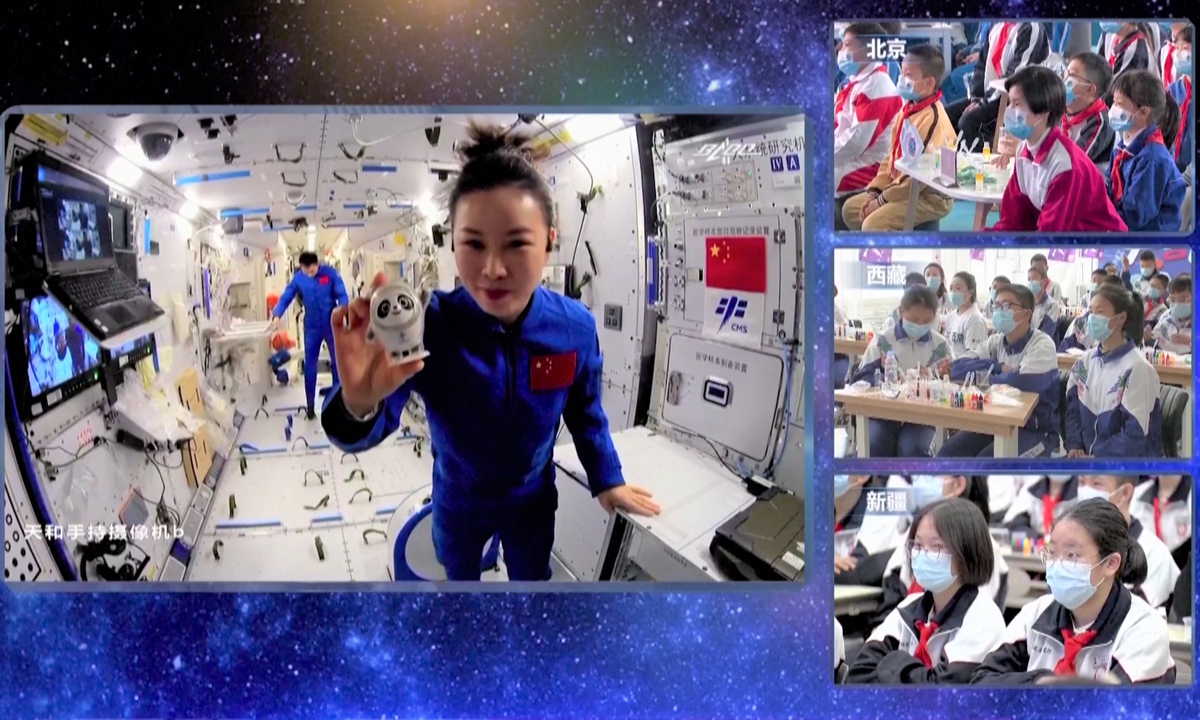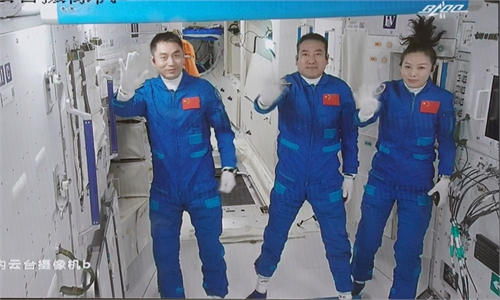SCI-TECH / AIR & SPACE
Live from space, Shenzhou-13 taikonauts deliver 2nd Tiangong class
Class connects, inspires students from Xinjiang, Xizang

Shenzhou-13 taikonaut Wang Yaping shows Beijing Winter Olympic Games mascot Bing Dwen Dwen during the second live session of the Tiangong classroom lecture series from China's Tianhe space station on March 23, 2022. Screenshots show students from Beijing, Xinjiang Uygur and Xizang autonomous regions watching the live session. Photo: VCG
The three taikonauts in the hour-long session interacted with students from the Chinese capital Beijing, Urumqi of Northwest China's Xinjiang region and Lhasa of Southwest China's Xizang region. In the first lecture, students from Hong Kong and Macao special administrative regions participated in the class.
Students from Xinjiang and Xizang passionately raised questions that they have observed in comparison with their daily lives, including whether water can boil in space or has a lower boiling point like it does in Xizang, or whether fruit flies they raised at home can be sent into space for experiments. The Shenzhou-13 crew took the questions patiently one by one.
One of the most impressive experiments was the "ice ball" experiment. As taikonaut Wang Yaping showed, while the space station maintains a fixed ambient temperature at all times, she can transform water into "ice" with only a "tap." It turned out to be a crystallization effect caused by the micro-gravity environment in space.
During the lecture, a "mysterious guest" also showed up at the space station - superstar Bing Dwen Dwen, the most-loved Olympic mascot at the Beijing 2022 Winter Olympic Games. The comment section under the livestream exploded with excitement, as netizens said that they were so thrilled to see the panda that wears a space suit coming to space.
"Special assistant Professor Bing reporting from space!" one netizen said. Another joked that "judging from its figure, the chubby Bing Dwen Dwen definitely cannot pass the physical examination. But never mind, it can get special treatment for having such a huge fan base."
The livestream was broadcast by China Central Television, drawing a total of 3.3 million views and over 120 million likes.
Although a number of countries have engaged in space lectures, only China and the US have realized the livestreaming of lectures with smooth two-way connections between Earth and space, Yang Yuguang, vice chairman of the Space Transportation Committee with the International Astronautical Federation, told the Global Times.
For live classes, the most critical aspect is the ability to guarantee the uninterrupted two-way connection during a rather long period of time, and that would require the help of relay satellites, experts said.
With Tianlian relay satellites at hand, China has achieved close to 100 percent coverage of the Earth, so there is no limitation on the length of the lectures, Yang explained.
Elaborating on why space powers have been pursuing the practice over the past decades, observers said that it will not only promote people's understanding toward the values of manned spaceflight but more importantly, serve as an inspiration to youngsters and boost the country's talent reserve in the fields of science and technology.
"Unlike remote sensing satellites or communication and navigation satellites, which can bring direct benefits to people's lives and the national economy, manned space activities usually do not offer a direct economic return. Space lectures can promote the public understanding of the importance and values of manned space activities, and that's why China has taken space science popularization as one of the major functions of the Tiangong space station," Yang said.
"The space experiments stimulated the enthusiasm of our young people to devote themselves to the industry, and the significance of this activity has gone far beyond itself to cultivate successors for China's space industry," Pang Zhihao, a Beijing-based member of the expert panel of China's first live space lecture, told the Global Times on Wednesday.
China has completed basic function tests, achieved key experimental technology breakthroughs, and attained high-quality in-orbit test results and application data of the two large scientific research facilities - namely, the container-free material science laboratory cabinet and the high-microgravity science laboratory cabinet - onboard the country's orbital Tianhe core module, mission insiders told the Global Times previously in March.
The Shenzhou-13 crew members are expected to complete their six-month record-long stay in orbit and return to Earth by April.
The trio has completed more than 20 scientific experiments in orbit, conquering multiple world's firsts in China's Tianhe space station core module, Li Yinghui, deputy chief designer of the country's astronaut system, told CCTV on Wednesday.
According to Li, the zero-gravity environment has facilitated human research on life science studies. The experiments the crew successfully carried out focused on new technology to monitor astronauts' wellbeing in space, innovation and new discoveries as well as data collection.
The Shenzhou-13 crew, Li said, transformed renal epithelial cells from human urine into vigorous stem cells with multiple functions via genetic reprogramming, and these stem cells were differentiated into cardiomyocytes, which marked a world's first.
The crew then edited a fluorescent protein to the cardiomyocytes through genetic modification, so that we could see the blinking of the calcium signal during contraction, which is also the first time in the world to see the beautiful cardiomyocytes in a weightless environment, Li noted.
Li said these studies will give us a better understanding of how the weightless environment affects human beings, and also provide a great experimental model to contribute to the study of general public health issues such as aging and the occurrence of heart diseases.
Chinese researchers also completed the world's first suspension culture experiment of skin stem cells under long-term weightlessness, thanks to the Shenzhou-13 crew and the country's space station, Li revealed, noting the study of cells will help us understand more about life.

-BingDwenDwen somersaults to demonstrate parabolic experiment -Transform water into "ice ball" with only a "tap" Check out Shenzhou-13 taikonauts' 2nd live session of Tiangong classroom series, which inspires youngsters' dreams.


